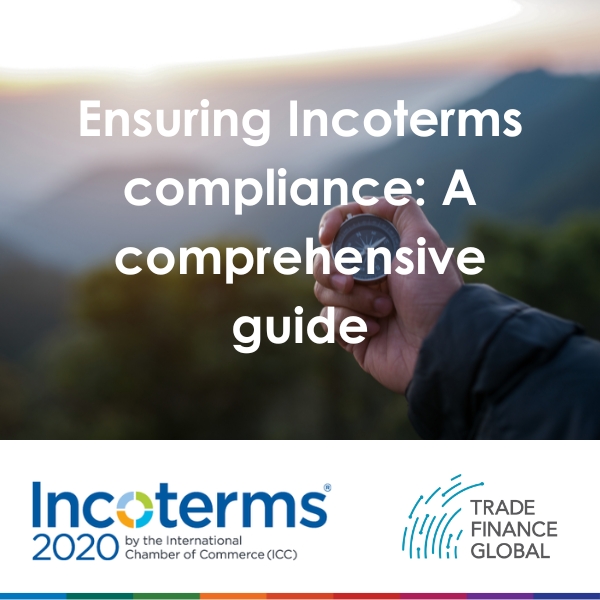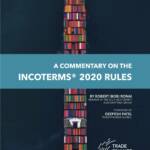Ensuring Incoterms compliance: A comprehensive guide [UPDATED 2025]


Access trade, receivables and supply chain finance
We assist companies to access trade and receivables finance through our relationships with 270+ banks, funds and alternative finance houses.
Get StartedContent
Ensuring Incoterms compliance: A comprehensive guide [UPDATED 2025]
Incoterms, short for International Commercial Terms, are standardised trade terms used worldwide to clearly define the responsibilities of buyers and sellers in international transactions. They determine who is responsible for transportation, insurance, duties, and other logistics.
Complying with Incoterms is important as they can affect cost, risk, and logistics management.
Understanding and implementing the following guidelines can help prevent disputes and streamline trade processes.
Key components of Incoterms compliance
To adhere to Incoterms effectively, you should:
- Understand the Incoterms rules: Familiarise yourself with the latest Incoterms rules (currently Incoterms 2020) and ensure all relevant staff are trained on the specific Incoterms used in your transactions.
- Document responsibilities: Clearly outline the responsibilities of buyers and sellers in the sales contract and specify the chosen Incoterm and the precise point of delivery or transfer of risk.
- Communicate with trade partners: Maintain clear and consistent communication to ensure mutual understanding of responsibilities and regularly update trade partners on any changes in Incoterms rules or compliance requirements.
- Monitor and audit compliance: Implement a system for regularly monitoring and auditing compliance with Incoterms and promptly address any discrepancies or non-compliance issues.
Common challenges in adhering to Incoterms
If you transact under Incoterms, you should be aware of certain common challenges, including:
- Lack of understanding: Misunderstanding Incoterms rules and responsibilities can lead to incorrect applications and disputes with trading partners.
- Miscommunication: Miscommunication between buyers and sellers can result in misunderstandings regarding responsibilities and costs. Clear communication is crucial to ensure both parties are on the same page.
- Regulatory differences: Differing regulatory requirements in various countries can complicate compliance with Incoterms. Understanding and adhering to the local regulations of both the exporting and importing countries is essential.
- Documentation errors: Incomplete or incorrect documentation can lead to delays, fines, and non-compliance issues. Ensuring accurate and complete documentation is vital for smooth transactions.
Best practices for ensuring Incoterms compliance
To increase your ability to comply with Incoterms, you should follow several best practices. These include:
- Training and education: Provide regular training and education for all relevant staff on Incoterms rules and updates. Many trade organisations provide resources such as webinars, workshops, and courses.
- Clear documentation: Ensure that all contracts and shipping documents specify the chosen Incoterm and related responsibilities. Double-check all documentation for accuracy before finalising transactions.
- Regular audits: Conduct regular audits of trade transactions to ensure compliance with Incoterms. Implement corrective actions promptly when you identify any non-compliance.
- Effective communication: Establish clear communication channels with trade partners to discuss Incoterms and compliance expectations. Hold regular meetings to review Incoterms-related issues and updates.
- Using technology: Use technology and software solutions to manage and track Incoterms compliance. Implement automated systems for document management and compliance monitoring.
- Understand local regulations: Research the regulatory requirements in exporting and importing countries and ensure that your chosen Incoterm complies with local trade regulations.
- Comply with customs: Work with customs authorities to ensure all documentation and processes comply with Incoterms and local regulations. Stay updated on changes in customs regulations that might affect Incoterms compliance.
- Legal considerations: Consult legal experts to ensure your contracts and trade practices adhere to Incoterms and relevant laws. Include clauses in your contracts that address compliance with Incoterms and local regulations.
FAQs
- LEARN MORE ABOUT INCOTERMS
- LATEST INCOTERMS NEWS















